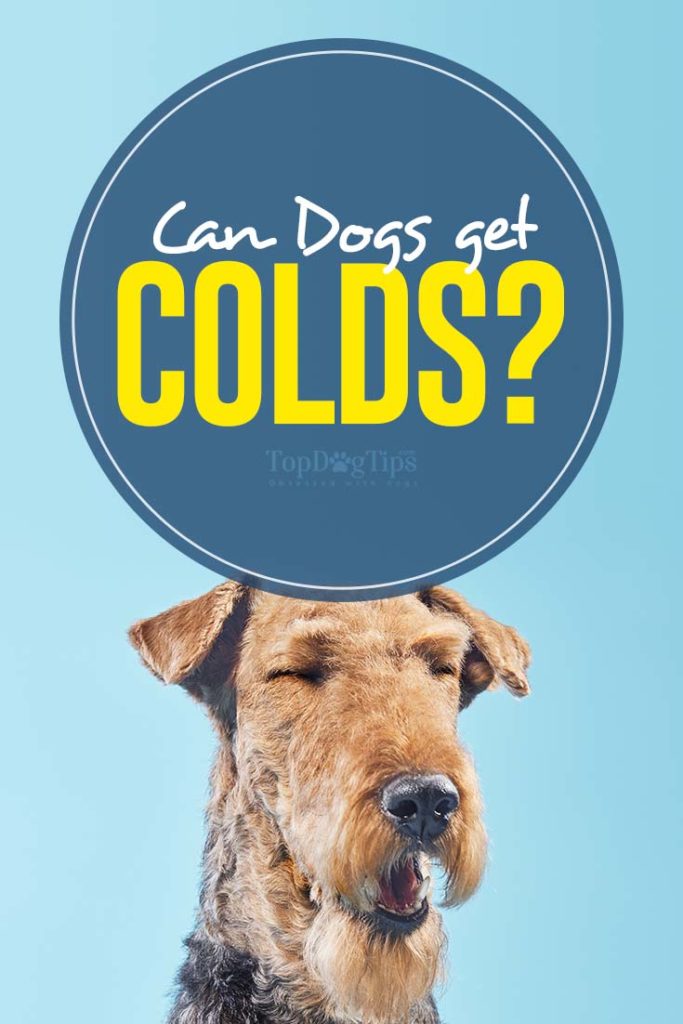
Table of Contents
The infamous cold and flu season is here. Can dogs get colds just as humans can? Yes and no.
Your dog could pick up a “cold” from going outside, playing with other dogs, or being around other animals in the house.
But there's more you need to understand about it and dog cold symptoms.
Can Dogs Get Colds?
(and what you can do for your dog)
Can dogs catch a cold just as we can?
Technically, dogs don’t get “colds” the way that humans get colds.
Dogs get upper respiratory infections (URI) and sometimes a cough.
These can be due to a variety of reasons, and in severe cases, most commonly because of kennel cough, canine influenza, or pneumonia in dogs.
An upper respiratory infection can be mild or severe, depending on the symptoms.
Mild URIs will usually pass on their own. Severe ones can require a trip to the vet.
If you think your dog has an upper respiratory infection, the first thing you should do is make a note of the day that you first noticed dog cold symptoms on the calendar to track how long these symptoms last.
So, can dogs get colds, otherwise known as upper respiratory infections? Absolutely, they can.
However, there are some more serious health problems that share similarities to dog cold symptoms. Here's what you must be aware of.
ALSO READ: 15 Ways to Keep Your Dog Healthy in the Fall
“Can my dog catch my cold (and vice versa)?”
No – dogs cannot catch a cold from humans, and neither can humans catch a cold from a dog. The viruses that affect dogs and humans are different; thus, they won't survive in different organisms. You can snuggle away with your pooch even if he's got a cold.
However, there are a few things to keep in mind:
Dogs can catch a cold from other dogs. This is very common when your pet hangs out in places with plenty of other dogs, such as dog parks or boarding facilities.
“…people who get sick may not realize they can pass the flu not only to other humans, but possibly to other animals, including pets…”
Another thing is the “dog flu,” better known as canine influenza. Unfortunately, in this case, dogs pass on this virus to you, and you can pass on this virus to dogs as well.
This is known as reverse zoonosis, which is still poorly understood by scientists and veterinarians, but there have been plenty of cases where humans got infected with H3N2 and H1N1 infections from dogs and cats.
When Your Dog Is Coughing
Before looking at the dog's cold symptoms, it’s important to understand coughing in dogs.
If you notice that your dog has a dry, non-productive, or raspy cough but few other cold symptoms, you'll need first to confirm that it's not kennel cough.
Kennel cough, also known as Canine Infectious Respiratory Disease (CIRD), can be a serious health problem and is much more dangerous than a dog cold.
“Your description of the nature of the cough, when the cough occurs, and if anything brings on coughing can be very helpful in pinpointing the cause.” – College of Veterinary Medicine
The most common way of getting kennel cough is by being around other dogs. It usually happens in places like doggie daycare, dog training classes, boarding facilities, or dog parks. If your dog has not been vaccinated for kennel cough, and you notice your dog coughing, there's little you can do yourself, and you will need to visit your vet right away.
Most of the time, if a dog is going to be in close contact with other dogs, like at a boarding facility, they will be required to have a kennel cough vaccination.
So, if your dog hasn’t been around other dogs or your dog has been vaccinated, then you can be reasonably sure that the symptoms aren't related to kennel cough.
Other reasons can be canine influenza (which is more of a “dog flu” than a “dog cold”) and pneumonia.
Both of these conditions are serious and will have slightly different, more obvious symptoms that would not be mistaken for a general cold in dogs.
Dog Cold Symptoms (or URI symptoms)
After ruling out kennel cough from the equation, you can examine dog cold symptoms. Here's what you're likely to notice if your dog has an upper respiratory infection:
- Dry cough
- Wheezing
- Runny Nose
- Runny Eyes
- Fever
- Lethargy
- No appetite
- Sneezing
- Nasal discharge
- Congestion
- Trouble breathing
These dog cold symptoms can range from mild to severe. They usually last for three to seven days.
If your dog has any of these upper respiratory infection symptoms for more than seven days, you should take your pooch to a vet.
The vet may give your dog antibiotics to help get rid of the URI. Your dog might need additional fluids—dogs get dehydrated quickly when they are fighting off an upper respiratory infection.
Just like in “human colds,” a dog cold will hit vulnerable populations the hardest.
If you have a young puppy or a very old senior dog, you shouldn’t wait seven days to take the dog to the vet for medical help because their immune system is likely much weaker.
RELATED: Can Dogs Get Cold Sores?
How to Take Care of a Dog That Has a Cold
So, can dogs get colds? Yes, they can.
But is there anything you can do to help your pooch fight it off? Yes and no—you may not be able to cure your dog’s cold, but you can do plenty of things to make your dog more comfortable until the cold passes.
Here is a collection of home remedies for dog colds and nice things to do for your Fido to keep them comfortable until they are over the cold:
1. Keep Your Dog Warm
 Your dog could be chilly or very sensitive to drafts if he or she has a cold. Make sure that your dog’s bed or crate is not in the direct path of any drafts. The cheapest way to keep your dog warm is to use plenty of blankets, which you can simply drop by your dog's bed or crate and allow your pooch to curl up on them or under them.
Your dog could be chilly or very sensitive to drafts if he or she has a cold. Make sure that your dog’s bed or crate is not in the direct path of any drafts. The cheapest way to keep your dog warm is to use plenty of blankets, which you can simply drop by your dog's bed or crate and allow your pooch to curl up on them or under them.
Try also using a dog bed warmer on your pet's bed, an electric or heated blanket, or a dog heating pad.
You can also drape your dog's crate with blankets to eliminate drafts and give them a warm and dark place to rest.
You might also want to turn the heat up a little, use a space heater to heat the room where your dog is, or use a dog house heater if your pooch has his own house.
2. Encourage Your Dog to Drink
Getting enough fluids is critically important for dogs who are sick, just like it’s important for you to drink fluids when you have a cold or the flu.
Your dog may not want much water, but make sure that clean and cool water is always available to your dog.
Unflavored electrolyte drinks like Pedialyte can also be good for dogs that are fighting off an illness.
You can even give your dog chicken broth that’s been warmed up —just make sure it doesn’t have any onion or spices in it.
Plain chicken broth is the best thing to give a sick dog.
3. Spend More Time With Your Dog
Other than directly attempting to treat dog cold symptoms and alleviating the discomfort, you can affect your pooch emotionally as well.
Dogs love being petted, so make the time to spend the afternoon close to your dog or let your dog sleep close next to you at night.
4. Make Tempting Food
One of the dog cold symptoms is your pet's refusal to eat.
If your pooch refuses to eat his dry kibble, you can tempt him with a can of wet dog food because they usually smell better or make a homemade dog food meal (here are some recipes to try).
For a homemade dog food recipe, even a simple blend of boiled chicken or hamburger with plain rice will do.
This nutritious home-cooked meal will entice even a very sick dog to eat it. And it’s easy to make a big batch of it and just reheat some whenever it’s time for your dog to eat.
It’s important that your dog continues to eat. If your dog refuses food anyway, you can try using dog food flavor enhancers to make his meals more appealing.
And if he isn't consuming enough calories, then it’s fine to give him some healthy dog treats to increase the amount of calories and nutrients consumed, which is vital.
5. Sit In A Steamy Bathroom
This is a great way to bust that congestion that is making it tough for your dog to breathe.
Turn on the shower as hot as it will go and let it run full force without turning on the bathroom exhaust fan.
The bathroom will quickly fill up with warm, steamy air.
Sit in the bathroom with your dog for 15-20 minutes a few times a day to loosen up that congestion.
6. Allow for More Naps
Encourage your dog to rest more while he or she is sick by taking naps together.
It's likely your dog will choose to nap more by himself, so simply avoid bothering him and allow the dog to rest as much as needed. Get some comfortable dog blankets for him.
7. Keep Your Dog's Nose Moist
 Often, when dogs have a cold, they will lick their running noses until they are chapped and sore. They might even get dry, and the skin might crack. There are specially formulated products for dogs' dry skin you can use to prevent this and to keep the skin moisturized. For the cheapest solution, plain old petroleum jelly works really well, too, and doesn’t come with a designer price tag.
Often, when dogs have a cold, they will lick their running noses until they are chapped and sore. They might even get dry, and the skin might crack. There are specially formulated products for dogs' dry skin you can use to prevent this and to keep the skin moisturized. For the cheapest solution, plain old petroleum jelly works really well, too, and doesn’t come with a designer price tag.
8. Use A Humidifier
A cool mist humidifier is a great thing to have in the winter to make your dog feel better all the time, not just when you notice dog cold symptoms.
Running a humidifier will add much-needed moisture to the air so that your dog isn’t breathing in dry air.
Humidifiers can cut down on allergens in the air, help with asthma, and help sick and congested dogs breathe more comfortably.
9. Limit Time Outdoors
When your dog has a cold, don’t make the dog go outside for long periods of time, especially in the wintertime.
Consider putting some training pee pads down so that the dog doesn’t have to go outside.
If the dog does go outside, keep him there for only as long as it takes him to do the business and then bring him back inside.
Another alternative is to try a dog litter box, which is especially good for cases like these.
You might want to skip the walks until your dog is feeling better, especially if the dog's cold symptoms are severe and your dog is very lethargic.
It's likely your dog is going to get over the cold a lot faster if he or she can be inside where it’s warm, get plenty of rest, drink fluids, and consume enough calories.
The Bottom Line
So, can dogs get colds? Yes, they can, but not in the way humans do.
The closest thing to a regular cold that a dog can get is called an upper respiratory infection (URI).
It can be severe or mild and will need to be treated accordingly.
Other related health problems that have similarities to dog cold symptoms may include kennel cough, canine influenza, and pneumonia.
If you notice any of the symptoms of these conditions, you must take your pet to the vet immediately.
Other than that, mild dog colds cannot be cured, and it will take some time for your Fido to recover.
Give your pooch some space, allow him to rest, provide a warm bed and environment, and encourage him to eat and drink plenty of fluids.
READ NEXT: When Is It Too Cold for Dogs to Be Outside?














